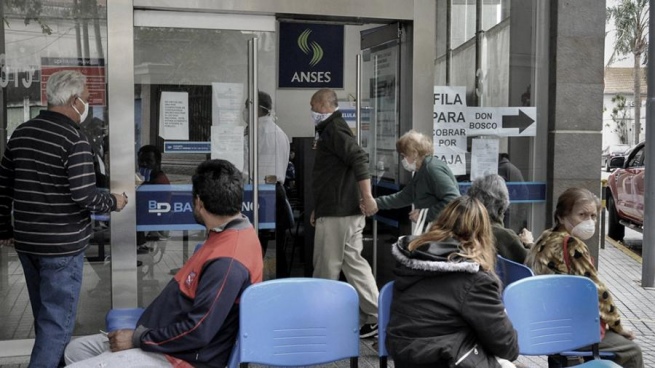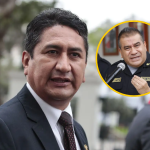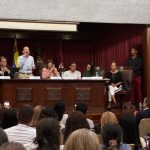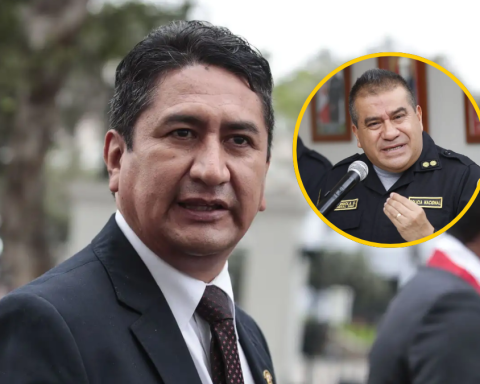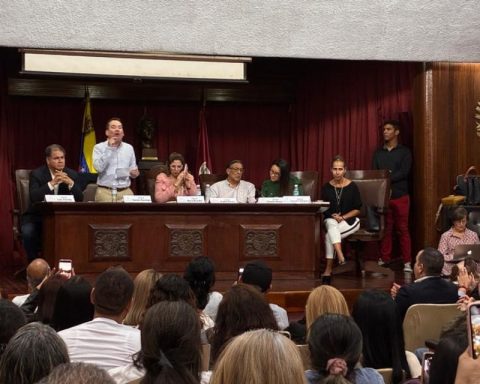The spokesperson for the Presidency, Gabriela Ceruticonfirmed that “there will be a bonus for retirees”, while leading a press conference at Casa Rosada.
The Government will announce “in the next few hours” an extraordinary bonus for retirees and pensioners, Cerruti said.
In the usual Thursday press conference at Casa Rosada, Cerruti pointed out that the characteristics of the special assignment are being analyzed by the Minister of Economy, Martín Guzmán, and the director of the National Social Security Administration (Anses), Fernanda Raventa.
The spokeswoman also recalled that the Minister of Productive Development, Matías Kulfas, had said that “he did not affirm or rule out” the granting of the bonus, and that the details on the amount, scope and implementation will be announced by President Alberto Fernández.
The Government had already resorted to granting extraordinary bonuses for retirees and pensioners with the lowest assets on the scale in 2020 and 2021.
The decision to grant a new bond coincides with the measures taken by the Ministries of Productive Development and Agriculture, Livestock and Fisheries to contain the rise in prices.

In accordance with the Retirement Mobility Law, the adjustments in retirement are quarterly based on the combination in equal parts of the evolution of the pension collection and of the salaries established in the Average Taxable Remuneration of Stable Workers (Ripte).
For the December 2021-February 2022 quarter, the adjustment was 12.11% and the accumulated inflation in the same period was 12.9%, according to the National Institute of Statistics and Censuses (Indec).
The increase in retirement, pensions and family and universal allowances for the March-May quarter of this year is 12.28%.
The Scalabrini Ortiz Center for Economic and Social Studies (CESO) made an estimate of the fiscal cost of an eventual bonus of $10,000 for retirees, $7,000 for beneficiaries of universal child and pregnancy allowances, the already announced $6,000 for those who receive the Plan to Promote Work and an update of 50% of the Food Card for the rest of the year.
All these additional resources would represent an outlay of $138,000 million, equivalent to 0.18% of the Gross Domestic Product (GDP), according to the latest report from the entity.
Work agenda
According to the spokeswoman, the reduction in poverty and indigence rates mark that “Argentina is at a pivotal moment” and that it is “on a good road“.
The drop in the poverty rate to 37.3% in the second half of 2021 “indicates that the path” taken by the Government to resolve the socioeconomic situation “is the right one”, although the numbers in this regard “remain high,” he said. Cerruti.
“These numbers are obviously encouraging,” Cerruti said, later linking the improvement in social indicators to growth in the economy and employment.
Likewise, he warned that in order to strengthen that recovery it was “essential” to have closed the agreement with the International Monetary Fund (IMF), since without that contribution “we would have had a default” and the poverty rates “would have grown to an unimaginable level”, although the measurement of the National Institute of Statistics and Censuses (Indec) corresponds to the second semester of 2021.
The Spokesperson highlighted that in the drop in the poverty index “economic growth is having an impact” and that the evolution of the indicator “almost reflects the growth of employment” in the same period.
In this sense, he stressed that the improvements in the indicators of economic activity “are not only reflected in levels higher than those of the pre-pandemic” but are even “higher than those of 2019.”
In this regard, he pointed out that “the world is going through very complex times” and that the war between Russia and Ukraine “is having reflections in Argentina.”
Work agenda
Cerruti affirmed that the president Alberto Fernandez and the head of the Chamber of Deputies, Serge Massaadvance in the definition of “in a parliamentary work agenda” to “build State policies” with the opposition.
Regarding these dialogues that are promoted by the ruling party at the parliamentary level, the spokeswoman indicated that “Sergio Massa is carrying out conversations in agreement with the President so that a number of projects that have to come out can be carried out in the parliamentary year.”
For his part, continued Cerruti, “the President is having meetings with businessmen, trade unionists, members of civil society and social organizations that allow us to consolidate this moment of economic growth.”
“The President is holding meetings with businessmen, trade unionists, members of civil society and social organizations that allow us to consolidate this moment of economic growth”
The spokeswoman said that the objective of these meetings is “to advance in the great battle that has to do with food prices and inflation.”
After reviewing different economic indicators, Cerruti evaluated that “economic activity reflects pre-pandemic levels” and considered that we are witnessing “a pivotal moment in Argentina”.
Insisting on the round of dialogues held by the national government, the spokeswoman for the Presidency stressed that “conversations are being carried out with all sectors” and maintained that “these conversations have to be translated into pacts and political and social agreements to consolidate growth economic”.
In relation to the dialogue with the business sector, he added that “all the measures that are taken aim to take care of the table of the Argentines”, alluding to prices and inflation.

The spokeswoman explained that “we have already reached an agreement with the millers” to lower the price of bread and said that it is “not only about inflation” but about “redistribution, since growth does not spill by itself and we must distribute it so that it is fair for all”.
Respect to the camp maintained by social organizationsCerruti affirmed that the Ministry of Social Development “continues to work” to convert social plans into formal employment and confirmed that “there will be no new income” to the assistance programs.
“There is a salary delay that has been going on since 2019,” Cerruti said, later pointing out that the joint ventures “accompany” a recovery and confirm that the government’s objective “is that workers can have a decent life.”
boric is coming
Cerutti confirmed the visit to Argentina of the president of Chile, Gabriel Boricwho will arrive in the country on Sunday night and will have a “very important agenda” of activities.
“President Boric arrives on Sunday night,” confirmed the spokeswoman and clarified that it is a “state visit with a very important agenda.”
As part of the preparations for his arrival, Foreign Minister santiago cafiero He will receive this Thursday the new ambassador of Chile in Argentina, Bárbara Figueroa, in a meeting that will take place from 3:00 p.m. at the Buenos Aires headquarters of the Ministry of Foreign Affairs, according to official information.
Figueroa, a union leader and member of the Communist Party (PC), was chosen by Chilean President Gabriel Boric to succeed Nicolás Monckeberg, who had held the diplomatic post since January 2020 under Sebastián Piñera’s second term.
The new Chilean ambassador to Argentina, 42, was the first president of the Central Unitaria de Trabajadores de Chile (CUT) between 2012 and 2021, and was also the national director and head of education for the College of Teachers.
At the time of her appointment, she was Secretary of Sustainable Development of the Trade Union Confederation of the Americas (CSA) and Vice President of International Relations of the CUT.
